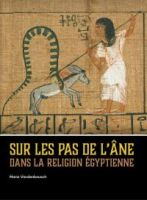Sur les pas de l’âne dans la religion égyptienne
Abstract
Donkeys were essential in ancient Egyptian trade and agriculture, but their value was nuanced by their perception in religion. The animal appears in funerary, magical or ritual sources, where it often reflects an ambivalent nature, while its well-known association to the evil god Seth is constantly reminded in the modern literature. Either benevolent or evil, donkeys are ambiguous entities that can be recognised as dreadful beings possessing powers praised for their protective efficiency. Although they can be associated to Seth, they also followed their own path. In magical texts, the animal was feared and revered at the same time, becoming a powerful entity holding spears and evoked as a protector, while in the context of the temple it will be annihilated as the archetype of evil. By exploring iconographical, textual and archaeological sources spanning from Predynastic to Roman times, this monograph explores the role of donkeys in ancient Egypt from a religious perspective.


 Download
Download Web Shop
Web Shop